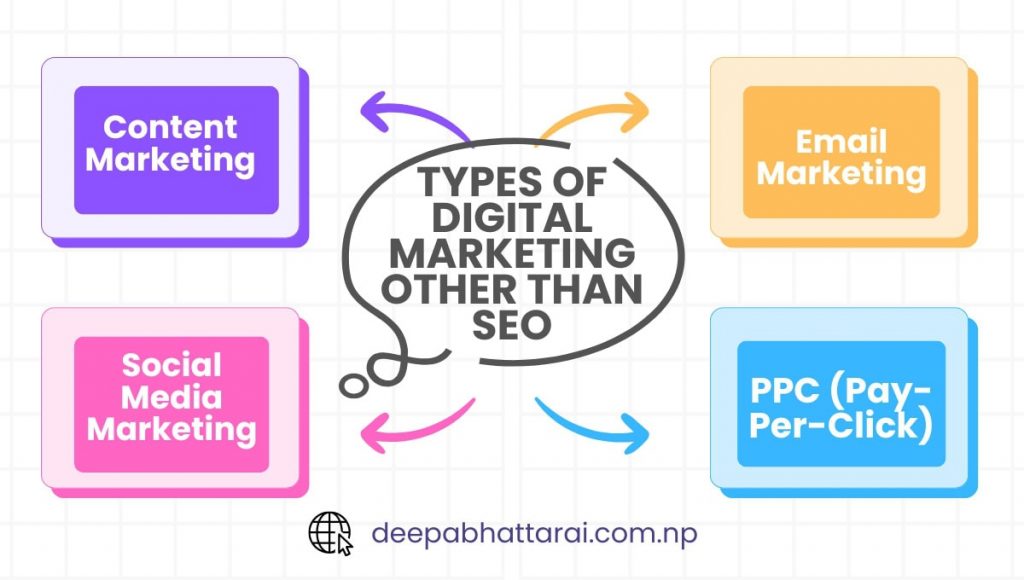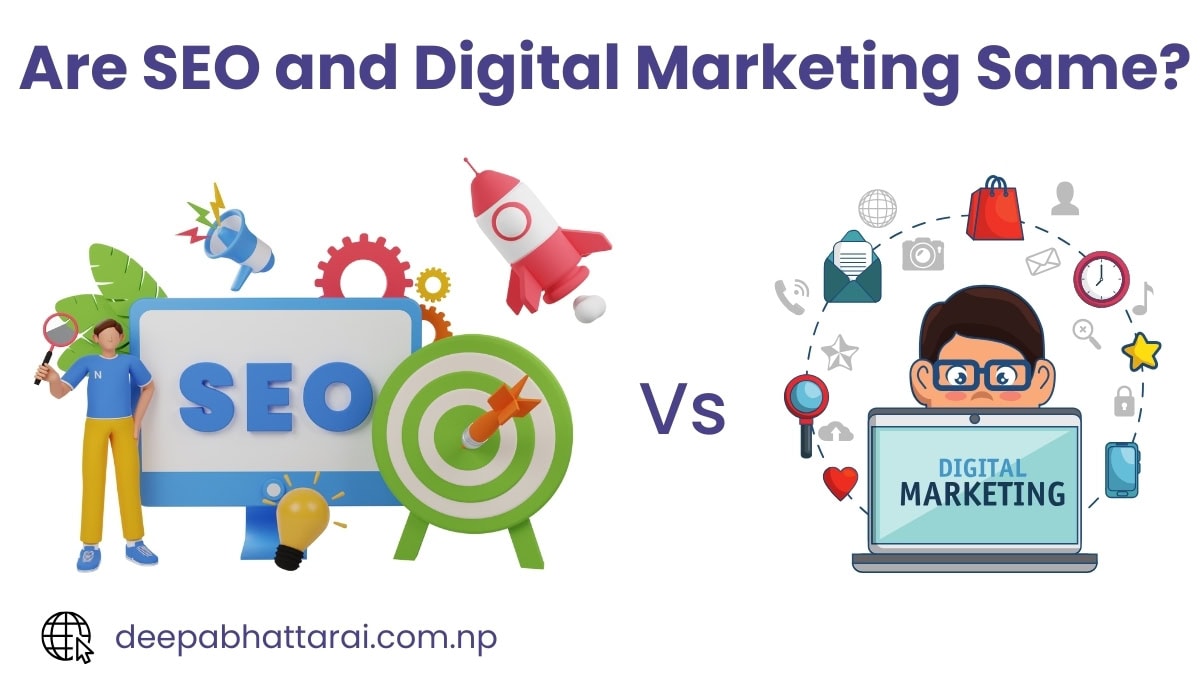Are SEO and Digital Marketing Same? SEO vs Digital Marketing
You may have often heard the question, “Are SEO and Digital Marketing same?” While SEO is indeed a vital component of digital marketing, the two are distinct. Digital marketing includes all online marketing activities to promote a brand and drive conversions, while SEO specifically focuses on improving a website’s visibility and ranking in organic search engine results.Â
Let me clarify the concepts of SEO and Digital Marketing in detail, highlight their key differences, and help you determine which strategy might be more beneficial for your business in Nepal.
What is SEO?
Search Engine Optimization, or SEO, is enhancing your online content so that a search engine likes to show it as a top result for searches of a certain keyword.
At its core, SEO is about increasing the visibility and accessibility of your website in organic search results. It involves various strategies and techniques such as optimizing keywords, improving meta tags, and ensuring your site’s structure is search-engine friendly.
The goal is to attract more visitors to your site by making your content more relevant and easily discoverable by users who are actively searching for information related to your products, services, or industry.
Is SEO Important while conducting Digital Marketing Campaign?
SEO is crucial for digital marketing because it directly affects how much visibility your online content gets from potential customers. By optimizing your site and content for search engines, you increase the likelihood that your target audience will find you when they’re searching online.
Effective SEO strategies can lead to higher search rankings, which typically translate to more traffic and, ideally, more conversions.
Without SEO, even the most well-crafted and useful content might remain hidden from those who could benefit from it most, making it a fundamental component of any successful digital marketing plan.Â
To maximize your digital marketing efforts, consider partnering with an SEO expert in Nepal today.
What is Digital Marketing?
Digital marketing encompasses all marketing efforts that use an electronic device or the internet. It’s a broad field, including everything from social media campaigns and email marketing to digital advertising and online branding.
The goal of digital marketing is to connect with your audience in the right place and at the right time, offering them tailored solutions through the digital platforms they frequent.
This approach allows businesses to expand their reach, engage more comprehensively with customers, and achieve a higher return on investment (ROI) by leveraging various online marketing channels.
Types of Digital Marketing Other Than SEO

Effective digital marketing requires a diverse range of strategies, each tailored to specific channels and goals.
Here are some of the most common and powerful digital marketing strategies:
- Content Marketing: Creating and distributing valuable, relevant, and consistent content to attract and retain a clearly defined audience, ultimately driving profitable customer action.
- Social Media Marketing: Utilizing platforms like Facebook, Instagram, and X (former Twitter) to connect with your audience, build your brand, increase sales, and drive website traffic.
- Email Marketing: Sending emails to prospects and customers. Effective email marketing converts prospects into customers and turns one-time buyers into loyal fans.
- PPC (Pay-Per-Click): PPCÂis a model of internet marketing in which advertisers pay a fee each time one of their ads is clicked. Essentially, it’s a way of buying visits to your site, rather than attempting to “earn” those visits organically.
SEO vs Digital Marketing Based on Foundational Aspects
Understanding the key differences between SEO and digital marketing can help clarify their distinct roles and how they contribute to your overall marketing strategy.
Below is a table that outlines these differences based on several foundational aspects:
| Aspect | SEO (Search Engine Optimization) | Digital Marketing |
|---|---|---|
| Scope | Primarily focused on improving a website’s visibility in organic search results. | Encompasses a broader range of marketing activities across various digital channels beyond just search engines. |
| Targeting and Audience Reach | Targets users based on specific keywords they search for, aiming for relevance and intent. | Reaches a broader audience across multiple digital platforms using demographic, psychographic, and behavioral data. |
| Objectives and Goals | Aims to increase organic traffic, enhance SERP rankings, and improve user engagement on specific webpages. | Targets a wider set of objectives including brand awareness, lead generation, and customer acquisition across all digital fronts. |
| Techniques and Tools | Involves keyword research, on-page optimization (like meta tags and content improvements), and link building. | Utilizes a variety of tools and techniques such as PPC, email marketing, content marketing, social media strategies, and more. |
| Cost | Costs can vary significantly but generally lower over time as organic ranking builds. | Can be more expensive depending on the scale and type of digital advertising, tools, and platforms used. |
| Metrics and Measurement | Focuses on organic traffic metrics, keyword rankings, click-through rates (CTR), and backlink quality. | Uses a broader range of metrics including impressions, clicks, conversion rates, engagement rates, and overall ROI from various channels. |
| Strategic Integration | Often integrated within a broader digital marketing strategy to enhance content visibility and drive specific traffic. | Incorporates various strategies including SEO to create a comprehensive approach to online marketing that optimizes multiple channels. |
This table highlights SEO vs Digital Marketing. It shows how SEO is a specific tool within the wider context of digital marketing, each with its own unique strategies, goals, and methods. Understanding these differences will help you to leverage both SEO and digital marketing effectively so that and you can maximize your online presence and achieve your business objectives.Â
Which is Better for Your Business in Nepal?
Choosing between SEO and digital marketing in Nepal for your business isn’t about determining which is better, but rather understanding which strategy best meets your specific business needs and goals.
Both SEO and broader digital marketing play crucial roles in building a strong online presence, but their importance can vary depending on your target audience, industry, and objectives.
For example, imagine a travel agency in Pokhara, Nepal, specializing in adventure tourism and trekking expeditions. To enhance its online visibility and attract more clients, the agency employs both SEO and digital marketing strategies effectively.
Let’s see the scenario:
SEO: The agency optimizes its website content for keywords such as “trekking tours in Pokhara” and “adventure travel Nepal.” This strategic use of SEO ensures that when potential travelers search for trekking opportunities or adventure activities in Nepal, the agency’s website ranks highly on search engine results pages, making it easier for adventure seekers to discover their offerings.
Digital Marketing:In addition to SEO, the agency uses social media platforms like Facebook and Instagram to showcase stunning visuals of the Himalayan landscapes and share testimonials from satisfied adventurers. They also run targeted advertising campaigns on these platforms aimed at audiences interested in adventure tourism, further increasing their reach and attracting a global audience looking for unique travel experiences in Nepal.
This combined approach boosts the travel agency’s online presence and engages and inspires potential clients, leading to increased bookings and successful adventure tours.
FAQs on SEO and Digital Marketing in Nepal
How to start with SEO for beginners in Nepal?
For beginners in Nepal looking to start with SEO, the first steps should include:
- Learning the basics of how search engines work.
- Understanding keyword research and learning how to identify the right keywords that your target audience is searching for.
- Gaining knowledge on optimizing website content and structure for SEO, including on-page elements like titles, meta descriptions, and headers.
- Building awareness of off-page SEO techniques such as link building and social media integration.
- Practicing SEO skills on a real website, either by creating your own blog or helping a local business with their SEO.
- Keeping updated with SEO trends and algorithm changes, as SEO is a dynamic field that requires continuous learning.
Know what SEO Experts of Nepal says about how to become an SEO expert in Nepal.
What should I learn first, SEO or digital marketing?
Starting with digital marketing is often recommended because it provides a broad overview of various channels and strategies, including SEO.
Learning digital marketing first gives you a holistic understanding of how different components like social media, email marketing, and SEO work together.
Is SEO enough for digital marketing in Nepal?
While SEO is a powerful tool for generating organic traffic and improving online visibility, relying solely on SEO may not be sufficient for a comprehensive digital marketing strategy in Nepal.
Other aspects like social media engagement, email campaigns, and PPC advertising play crucial roles in reaching broader audiences and achieving diverse marketing goals such as brand awareness and customer engagement.
Is SEO enough for digital marketing in Nepal?
While SEO is a powerful tool for generating organic traffic and improving online visibility, relying solely on SEO may not be sufficient for a comprehensive digital marketing strategy in Nepal.
Other aspects like social media engagement, email campaigns, and PPC advertising play crucial roles in reaching broader audiences and achieving diverse marketing goals such as brand awareness and customer engagement.
